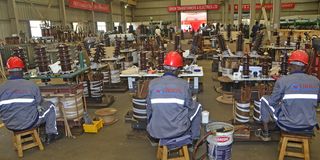Can you talk politics at office?

Workers at a factory. Experts advise that political discussions should rotate around issues and using the lessons within the corporate space. PHOTO/file
What you need to know:
Experts say employees have to walk a tightrope between raising their opinions and losing their professional value, and keeping mute and retaining their jobs.
The Ugandan general election is 30 days away and candidates are all working their charm to garner support for the big day next year. As they comb villages in this Covid-19 stricken country, employees stuck to their 8am to 5pm job are finding it harder to steer clear of daily events.
The flat screens that hang on office walls are the focal points of lunch time hours. In between the pile of assignments, social media spreads the news faster so they cannot help but scroll through their accounts, listen to candidates pledge a rosy future as well as watch their latest cat-and-mouse games with police. This is all the lot that has made people more vocal. You hear it in the cafeterias, corridors and follow it to their Facebook timeline. Others are choosing what they call “the careful option.”
“I was told it is not even safe to post politics on my status. People are shy when it comes to discussing those issues,” 27-year-old customer care agent Belinda Aketch says, “Some policies are not written down but you will just suffer the consequences.”
Mbarara-based engineer Hawa Nakadde has weighed her options too and made a decision. “Not allowed. In government, you do not discuss politics if you want to keep your job.”
Their self-censorship is justified. Experts say employees have to walk a tightrope between raising their opinions and losing their professional value, and keeping mute and retaining their job.
Companies have policies that guide how employees should relate with politics, with most of them recommending neutrality.
“It does not mean you show zero interest in politics. It does not mean you should not exercise your civic right to vote,” Abdul Kibuuka, executive director True North Consult says, “It encourages them not to show their political position in the office for instance not to campaign or carry political signs or memorabilia into the office.”
Kibuuka, a human resource professional, believes this deals with harmony in the office.
“You have a day job which requires a set of actions, of which campaigns for a political side are not part of. If you say discouraging people from debating politics stifles their freedom of speech is not correct, it is simply not part of their work. It is a distraction but most importantly, it will help you avoid conflict,” he explains.
28-year-old Corrine Akampa’s thoughts chime in perfectly with Kibuuka’s. “Talking politics is not allowed because people may fight and hate each other for what they believe in. Ugandan politics is like religion. It is not a discussion but an argument with all sides trying to show they are right,” the Kampala-based data analyst says.
On the other hand, socio-political commentator Crispin Kaheru describes elections as public processes that can be discussed in offices. Workplaces with an open discussion culture are more likely to consent to political debate.
“Workplaces are public spaces so it is fine. It is important to speak, to allow people to argue about politics, agree to disagree as long as colleagues are given the assurance that their political opinions of the day cannot in any way be used against them. If you censor discussions, you cultivate a closed office space and in this day and age, we should be opening up spaces,” Kaheru explains.
Social media can be the place for debate but even then, the expert suggestion is that employees declare that the views shared are personal and do not reflect those of the company they work for.
The challenge, however, is how you separate your individual opinions from the opinions of the company, says Patrick Ngolobe, chief executive officer Africa Executive Leadership Solutions. It is a delicate balance especially when people have a constitutional right to engage in debate.
Article 29 1(a) of the Ugandan Constitution states that every person shall have the right to freedom of speech and expression which shall include freedom of the press and other media. Human resource managers insist, even then, that employees have a duty of care not to drag the company along.
“Employees can fully debate within safe spaces. If your boss leans to the left and you lean to the right, it can generate an unhealthy relationship,” Ngolobe says.
But there is a right way to do it. The discussions should rotate around issues and using the lessons within the corporate space. Debates should not get sentimental. Debates should be from an informed point of view. To Ngolobe, keeping learned employees from such productive engagements is denying them the opportunity to shape the conversation.
“Professionals need to come out and put issues to the table for political actors to pick,” he says.
“Analyse issues around work and what you want to hear from politicians. Talk issues to do with salaries, safety at work or national health insurance, economic development, accountability, performance score cards for government leaders.”
Debate
‘Employees can fully debate within safe spaces. If your boss leans to the left and you lean to the right, it can generate an unhealthy relationship,’’ Mr Patrick Ngolobe, chief executive officer Africa Executive Leadership Solutions says.



